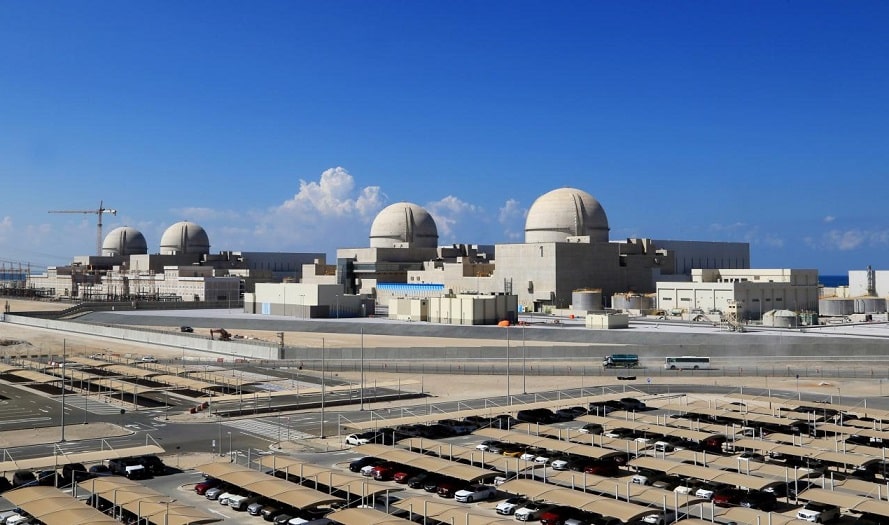


The UAE has completed the Barakah Nuclear Energy Plant, a significant step towards achieving net zero emissions. With this plant, the UAE aims to cover half of its electricity needs with renewable energy by 2050. Located in Al Dhafra, the plant will provide 25% of the country's electricity and power major industries.
The UAE's Pursuit of Nuclear Energy and Net Zero Emissions
Background
The United Arab Emirates (UAE) has long been a leader in the Middle East and North Africa region in terms of economic development and technological innovation. In recent years, the country has placed a growing emphasis on sustainability and reducing its carbon footprint. As part of this effort, the UAE has invested heavily in nuclear energy.
In 2015, the UAE launched the Barakah Nuclear Energy Plant project. The plant is located in Al Dhafra, in the western region of the country. Once fully operational, the plant will provide approximately 25% of the UAE's electricity needs and reduce the country's reliance on fossil fuels.
Significance of the Barakah Nuclear Energy Plant
The completion of the Barakah Nuclear Energy Plant is a significant milestone for the UAE on its path to net zero emissions. The plant is a key component of the country's ambitious climate change strategy, which aims to cover half of the country's electricity needs with renewable energy by 2050.
The Barakah plant is also the first nuclear power plant in the Arab world. It is expected to serve as a model for other countries in the region that are looking to develop their own nuclear energy programs.
Top 5 FAQs
1. What is nuclear energy and how does it work?
Nuclear energy is a source of energy that is released when the nucleus of an atom is split. This process is called nuclear fission. The energy released by nuclear fission can be used to generate electricity.
2. Is nuclear energy safe?
Nuclear energy is a highly regulated industry and there are strict safety measures in place to prevent accidents. However, there is always some risk associated with nuclear power, as there is with any form of energy production.
3. What are the benefits of nuclear energy?
Nuclear energy is a clean and efficient source of energy. It does not produce greenhouse gases, which contribute to climate change. Nuclear power plants also have a small land footprint compared to other forms of energy generation.
4. What are the risks of nuclear energy?
The main risks associated with nuclear energy are accidents and the disposal of radioactive waste. However, these risks are constantly being managed and mitigated by nuclear power plant operators.
5. What is the future of nuclear energy in the UAE?
The UAE is committed to developing its nuclear energy program and plans to build additional nuclear power plants in the future. The country sees nuclear energy as a key part of its strategy to achieve net zero emissions by 2050.

The Dhanteras festival proved to be a boon for Indian traders as consumers defied surging gold prices and spent an estimated Rs 1 lakh crore on the auspicious day. The Confederation of All India Traders (CAIT) reported a 25% increase in gold and silver sales, making up a significant portion of the total expenditure. Despite the economic slowdown, the tradition of purchasing gold and other items symbolising prosperity on Dhanteras remains strong, highlighting the cultural significance of the festival.

Union Railway Minister Ashwini Vaishnav, at the International Railway Equipment Exhibition (IREE), highlighted India's remarkable progress in railway modernisation, stating that under the leadership of Prime Minister Narendra Modi, the country has witnessed the construction of 35,000 kilometres of new railway tracks and electrification of 46,000 kilometres of tracks in the past 11 years. He praised the Confederation of Indian Industry (CII) for organising the IREE and urged them to think bigger and envision a global-scale railway exhibition that surpasses Germany's InnoTrans, showcasing India's growing capabilities in railway infrastructure and technology.

On Friday, the IRCTC website and mobile app faced technical issues, causing an outage and inconvenience to over 5,800 users trying to book tickets. Social media platforms were flooded with complaints as the server crashed during peak booking hours, with some suggesting the need for better technology to handle festive rush. Officials have assured that efforts are being made to restore normal operations.

In a boost for the festive season, Indian Railways has launched two special Vande Bharat trains between Delhi and Patna. These trains will run till November 17 and offer a luxurious and secure travel experience for passengers during Diwali and Chhath Puja. With stops at six important stations, these trains will cover a distance of 1,000 km in under 14 hours.

As India prepares for Dhanteras 2025, gold has already become the star of the show, with prices surging more than 50% this year and showing no signs of slowing. The combination of global and domestic factors, including safe-haven demand, central bank buying, and economic uncertainty, has pushed gold to an all-time high of over Rs 1,30,000 per 10 grams. As investors flock to add the precious metal to their portfolio, experts predict a continued upward trend, driven by lower interest rates, de-dollarisation, and geopolitical tensions.

India’s economy and markets are seeing a resurgence, with PE and VC investments soaring to a three-year high of $26 billion in 2025. The country’s growing affluence and digital transformation have spurred a luxury market boom, with high-end brands rushing in to meet the demand. The trend is supported by a shift towards larger, more strategic investments in sectors such as IT and consumer staples.

MCX December gold futures on the Multi Commodity Exchange (MCX) skyrocketed by 1.4%, reaching an all-time high of ₹1,32,770 per 10 grams. Meanwhile, silver prices dropped slightly on the MCX to ₹1,85,000 per kilogram. The surge in gold prices can be attributed to a weaker US dollar, strong spot demand, and positive global cues, making gold an attractive investment option. However, the rising prices may have an impact on shoppers this Diwali, as the cost for 10 grams of 24-carat gold has surpassed ₹1.3 lakh. Despite this, jewellers remain optimistic, as increased household liquidity and positive economic indicators continue to encourage discretionary spending.

The well-known fitness club chain, Planet Fitness, has recently opened a new location in Monument, Colorado. Located at 16096 Jackson Creek Parkway, the club will hold its official grand opening on Saturday with a celebratory event at 10 a.m. This new location promises to offer residents of Monument a state-of-the-art fitness facility and a wide range of amenities.

The CEO of Virgo Specialities Pvt Ltd, Ketan Kadam, has been denied bail for the second time for his alleged involvement in the Mithi river desilting scam. The sessions court noted that Kadam has "direct involvement" in the crime, having "managed money received from contractors in his shell companies." According to the Economic Offences Wing (EOW), Kadam and others conspired to defraud the Brihanmumbai Municipal Corporation (BMC) through irregularities in the tendering process. Kadam is accused of manipulating the terms and conditions of the tenders to benefit his company and causing losses to the BMC.

As India's luxury market continues to see a rise in demand, M3M India, one of the biggest real estate developers in Delhi-NCR, has announced the launch of Jacob & Co. Residences in Noida. This will be the first residential development in India under the iconic Jacob & Co. brand, and is expected to generate a topline of ₹3500 crore. The project will feature ultra-luxury serviced residences and limited-edition Jacob & Co. timepieces, elevating the ownership experience to a whole new level. With this venture, M3M aims to bring a truly global lifestyle to homebuyers in Noida and contribute to the nation building vision of Prime Minister Narendra Modi.